|
|
|
Sort Order |
|
|
|
Items / Page
|
|
|
|
|
|
|
| Srl | Item |
| 1 |
ID:
177207
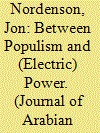

|
|
|
|
|
| Summary/Abstract |
Kuwait faces the double challenge of potentially destabilising effects of climate change as well as a changing international energy market in favour of renewables that may threaten the foundation of the oil-based economies dominating the region. Both these challenges point to the need for a transition towards more renewable energy sources and not least more sustainable patterns of energy consumption –– a transition that will be demanding for state and society alike. A successful green shift depends on a certain level of popular support or acceptance, yet it has proven difficult for the Kuwaiti government to gain support for their proposed solutions, and to reconcile the necessary changes with the existing relationship between state and society. This paper explores these challenges by studying public discourse concerning two contentious issues that are at the heart of the government’s economic reforms and of Kuwait’s planned efforts to cut GHG-emissions, namely fuel subsidy reform, and water and electricity conservation.
|
|
|
|
|
|
|
|
|
|
|
|
|
|
|
|
| 2 |
ID:
177208


|
|
|
|
|
| Summary/Abstract |
Given its limited oil and gas resources compared to its neighbours, energy diversification has been Oman’s stated goal since at least the 1980s. Yet, this paper argues that, due to the country’s structure of power generation, both issues of economic diversification and energy security are intimately linked and cannot be dissociated. Oman’s national policy for the energy sector, the political and economic challenges of the energy subsidy reforms implemented since the mid-2010s and the energy priorities as highlighted in the new long-term “Oman Vision 2040” national strategy are examined here. This paper also shows that the energy debate has played a critical role in the shaping of Oman’s foreign policy towards its Gulf Cooperation Council (GCC) counterparts, Iran and India, out of a desire to keep Oman’s –– more symbolic than real –– independence in working out its energy needs.
|
|
|
|
|
|
|
|
|
|
|
|
|
|
|
|
| 3 |
ID:
177209


|
|
|
|
|
| Summary/Abstract |
Global energy trade in hydrocarbons is being significantly re-oriented from the Atlantic basin to the Asia-Pacific region, with energy markets shifting their focus along the same patterns as the global economy –– towards the Asia-Pacific. The net result has been the centre of gravity of energy moving towards Asia and its large and emerging economies. The world is at the same time becoming a system of “world regions” and more urbanized, with the share of population of LDCs living in urban areas rising from 46% in 2014 to 57.9% in 2035. An emerging world region is arguably continental Asia in which East, Central, South and West Asia play a shaping part and developing its “Asianization”. It is argued here that economic orientation and urbanization trends will significantly impact global, and particularly Asian, energy markets thus determining the course of action of energy exporters of the GCC countries, and those of Central and West Asia. In Asia’s uneven energy markets, while China will lead energy demand growth in Asia in the 2020s, it will be India which likely will take up China’s mantle after 2025, thus maintaining and deepening the Persian Gulf’s “Asianization” and Asian energy interactions as part of a deeper integration of Asian economies.
|
|
|
|
|
|
|
|
|
|
|
|
|
|
|
|
| 4 |
ID:
177201


|
|
|
|
|
| Summary/Abstract |
On the occasion of the 10th anniversary of the Journal of Arabian Studies (JAS), this article offers the first history of the field of Gulf and Arabian Peninsula Studies (GAPS), including the origins and evolution of JAS. It begins with an overview of the origins and evolution of GAPS as a field of scholarship, then provides a detailed survey of the field’s institutional development, which can be traced back to the region’s post-war oil wealth and the large oil-funded archaeological expeditions of the 1950s–60s. This is reflected in GAPS’s first societies, centres, and journals, which catered exclusively to archaeologists, historians, and Arabists. The transformation of GAPS into a global interdisciplinary field (encompassing both humanities and social sciences) began in 1969, although it remained a fringe field within Middle East Studies. The expansion of GAPS into a mainstream field in its own right began in the 2000s, reaching critical mass in the 2010s, resulting in the establishment of the Association for Gulf and Arabian Peninsula Studies (AGAPS) and the launch of JAS. In the past decade, GAPS also expanded beyond Middle East Studies to embrace Indian Ocean Studies. The article concludes with an overview of JAS’s first decade: 2011–20.
|
|
|
|
|
|
|
|
|
|
|
|
|
|
|
|
| 5 |
ID:
177204
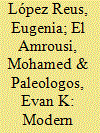

|
|
|
|
|
| Summary/Abstract |
Our work analyzes some key public, late modernist and contemporary buildings in Abu Dhabi in order to examine how the capital of this Arab country has dealt with issues of local tradition versus modernization, at a time of rapid economic and social change. Modernist and contemporary interpretations of Arab architectural tradition are deliberated as well as, design strategies to create spaces of social inclusion and provide sustainable solutions appropriate for the harsh regional climatic conditions. Our article also argues that recognition and integration of buildings from the late modernist era, such as the Abu Dhabi Cultural Foundation, are essential elements for a city of sparse historical references, playing the role of “modern heritage”. Preservation of such buildings and resilient architecture can guide contemporary architectural discourse and reconcile local tradition and modern design strategies, thus counteracting uncritical importation of iconic projects in the modern Gulf cities.
|
|
|
|
|
|
|
|
|
|
|
|
|
|
|
|
| 6 |
ID:
177210
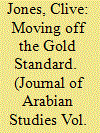

|
|
|
|
|
| Summary/Abstract |
This article analyses the rationale behind the pursuit of nuclear energy by the United Arab Emirates (UAE) and Saudi Arabia, a rationale that is best understood by a particular construct of “stateness”. While the drive towards nuclear energy is justified by a growing demographic, it is also about the projection of prestige which cuts to the very core of regime legitimacy. This in turn feeds into the growing ideational competition between and among the Gulf states and Iran, with nuclear energy increasingly being “securitised” in pursuit of this “stateless”. However, the development of a nuclear programme by Saudi Arabia in particular has come to test the normative frameworks that have hitherto regulated the transfer of nuclear technologies. With regionalism in retreat, and concern over the longer-term commitment of the United States to underpin Gulf security, the development of nuclear energy in the Gulf is leading to a truly “atomised” security complex, the dynamic of which can likely only be controlled on a bespoke basis.
|
|
|
|
|
|
|
|
|
|
|
|
|
|
|
|
| 7 |
ID:
177206


|
|
|
|
|
| Summary/Abstract |
Since Qatar launched its gas strategy in the mid-1990s it has transitioned from an economic and political backwater into a relatively significant small state actor in the international system. In these few decades, this tiny country has established itself as a key player in the global financial, investment and property markets. In 2010, it became the world’s number one exporter of Liquefied Natural Gas (LNG). Over the same period, it also established itself as a diplomatic player with a pro-active and multidimensional, not to mention controversial, foreign policy engagement across the Arab and wider Muslim world. This paper will examine Qatar’s rise as a global gas power since the 1990s in terms of the country’s evolving strategic vision. In particular, it will assess the centrality of gas power to the decision of policy elites since the late 1990s to prioritize long-term strategic positioning over short-term stability. Finally, it will conclude with an assessment of the ways in which Qatar has used its gas power since the launch of the embargo against it in June 2017 to achieve its strategic objectives at a time of rapid change in the regional security system and the global energy market.
|
|
|
|
|
|
|
|
|
|
|
|
|
|
|
|
| 8 |
ID:
177205


|
|
|
|
|
| Summary/Abstract |
This introduction outlines how the fragmentation of the Middle East state system, coupled with the shifts in the centrality of oil to the well-being of the Global economy, has now recast debates about the very nature of energy security and the future stability of the Gulf monarchies. Acting as a primer to the articles that comprise this special section of Journal of Arabia Studies, it highlights many of the attendant security issues surrounding energy diversification strategies now being adopted by many of the regions actors, while also highlighting the key differences that have shaped the responses of the individual Gulf monarchies to the challenges they now face in an ever more uncertain era.
|
|
|
|
|
|
|
|
|
|
|
|
|
|
|
|
| 9 |
ID:
177202
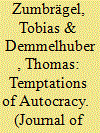

|
|
|
|
|
| Summary/Abstract |
In 2011 mass protests began to rapidly spread across the Middle East and scholarly attention shifted to the Gulf region, which not only remained resilient but rather asserted its authoritarian rule. We argue that such a development is considerably shaped by an individual protagonist country, we call an “authoritarian gravity centre” (AGC). We understand an AGC as an autocratic regime that has the willingness and the capacity (in terms of material and immaterial means) to apply pressure, to disseminate autocratic ideas, norms, values, and techniques, and to constitute a role model for other countries in the AGC’s geopolitical proximity. This study, which covers the period between 2001 and 2015, provides an empirical analysis of Saudi Arabia acting as an AGC in the Gulf. The qualitative research is based on fieldwork conducted in Riyadh, Doha, Kuwait City, and Manama. Using the approach of the AGC, we offer a conceptualization of the phenomenon of autocratization in the Gulf region.
|
|
|
|
|
|
|
|
|
|
|
|
|
|
|
|
| 10 |
ID:
177203
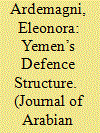

|
|
|
|
|
| Summary/Abstract |
Yemen’s defence structure presents a dynamic of “double hybridization”: hybridization due to the overlapping of tribal and military roles and loyalties, and hybridization because of the vague boundaries between formal and informal security actors. Since 2011 onwards, patronage has assumed a sub-state connotation, not a systemic one, occurring in a space of contested authority, beyond the state’s institutional perimeter: patronage develops outside the framework of the central state establishing direct connections between Yemeni local chiefs or warlords and Middle Eastern powers. This new dynamic highlights the deep crisis of the national level, revealing the fracturing of the state and of its formal institutions. Adopting critical security lenses and choosing the defence structure as unit of analysis, this article contends that the army used to rely, before 2011, on informal forces as coup-proofing strategy; since then, however, militias have turned now into the pillar of an emerging defence sector built on composite military alliances. While Yemen’s defence matrixes have changed, their hybridity persists, as, with the collapse of central state institutions, multiple military players have emerged.
|
|
|
|
|
|
|
|
|
|
|
|
|
|
|
|
|
|
|
|
|